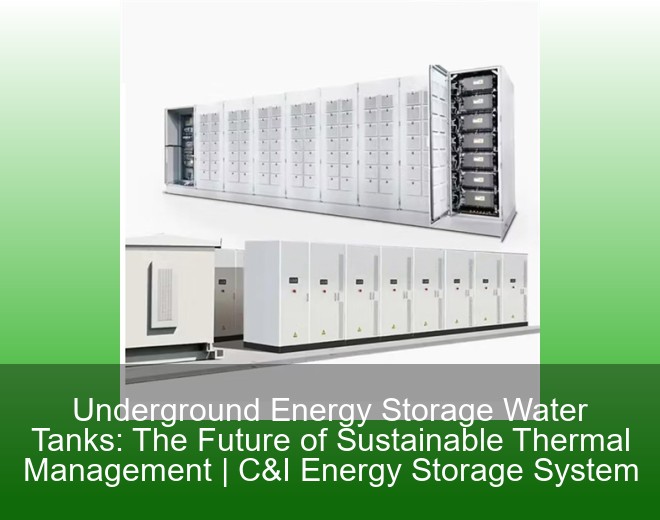
Let’s play a game: Imagine your electricity grid as a giant bathtub. Solar and wind power are like faucets pouring water in, but they’re as unpredictable as a toddler with the tap handle. Underground compressed air energy storage (CAES) acts like a drain stopper, holding excess energy until you need to pull the plug. Sounds simple? Well, this $33 billion global industry[1] is revolutionizing how we power our lives while making Mother Nature do a happy dance. [2025-08-02 22:25]

engineers scratching their heads over energy bills, urban planners sweating (literally) about carbon footprints, and eco-warriors dreaming of net-zero cities. If you’re in any of these camps, welcome! Underground energy storage water tanks are like the Swiss Army knives of thermal management—solving multiple problems while hiding beneath our feet. These systems store excess heat or cold in water reservoirs underground, ready to be tapped when needed. Think of them as giant thermal piggy banks for buildings, factories, or even entire neighborhoods. [2025-07-26 09:20]

Let's start with a wake-up call: That 100 gigawatt-hours of electricity generated annually by energy storage systems? That's enough to brew 7.2 billion pots of coffee – enough caffeine to keep New York City wired for 18 months straight[1]! The $33 billion global energy storage industry isn't just about keeping the lights on anymore; it's rewriting the rules of how we power everything from smartphones to smart cities. [2025-07-05 12:07]

Vanuatu, a tropical paradise with 83 islands, could soon become the hydrogen hub of the Pacific. Why? Because importing diesel for electricity is like using a flip phone in 2025 – outdated and expensive. Enter hydrogen energy storage, the island nation’s golden ticket to energy independence. [2025-06-24 13:12]

Ever wondered why your neighbor’s rooftop solar panels seem to work like magic even after sunset? The answer lies in energy storage – and the race to lower US singularity energy storage costs is reshaping how we power our lives. Let’s dive into the numbers, the game-changers, and why 2025 might be the year your electricity bill gets a much-needed diet. [2025-05-17 08:25]

If you’re researching energy storage solutions or curious about China’s tech dominance, buckle up! This article targets policymakers, renewable energy enthusiasts, and tech geeks hungry for insights into China’s air energy storage patent boom. With 60% of global compressed air energy storage (CAES) patents originating from China in 2024 alone[1][4][9], it’s like watching a dragon hoard treasure—except this treasure powers cities sustainably. [2025-03-25 04:04]

Imagine solving our energy storage problems by... literally moving concrete blocks up and down? That's exactly what gravity energy storage does – turning abandoned mines into giant "batteries" and transforming skyscrapers into vertical power banks. As renewable energy adoption skyrockets (pun intended), this physics-based solution is emerging as a dark horse in the energy storage race[6][7]. [2025-02-18 09:58]

Ever wondered how lifting heavy blocks could power your home? Enter gravity energy storage – the innovative method turning skyscraper physics into clean energy gold. By moving weights vertically (think: massive concrete blocks or water reservoirs), this technology stores excess renewable energy as gravitational potential energy. When the grid needs power, simply drop the weights to generate electricity. Simple? Almost deceptively so. But don't let the basic concept fool you – it's sparking a multibillion-dollar energy revolution[1][5]. [2025-02-16 10:34]

Imagine if your smartphone battery could recharge itself using gravity. Sounds wild, right? That’s essentially what hybrid energy storage systems—especially those combining pumped hydro with newer tech—are doing for power grids. As renewable energy booms, grids need smarter ways to store excess solar and wind power. Enter hybrid systems: the ultimate multitaskers in the energy world. Let’s unpack why they’re stealing the spotlight. [2025-02-02 06:47]

Imagine a room buzzing with engineers clutching blueprints, policymakers debating carbon tariffs, and startup founders demoing hydrogen-powered drones. That’s the Lebanon Hydrogen Energy Storage Conference in a nutshell. This isn’t just another tech talk – it’s where Middle Eastern innovation meets global energy giants to crack the code for renewable energy storage. Attendees range from grid operators battling Lebanon’s infamous power cuts to Saudi investors eyeing the next big thing in green tech[6][9]. [2025-01-21 18:27]

Let's face it – Ashgabat's marble-clad skyline isn't just pretty to look at. Beneath those gleaming surfaces lies a city grappling with energy demands that outpace traditional grid capacities. Enter the user-side energy storage tank, Turkmenistan's latest answer to keeping air conditioners humming in 45°C summers without blowing circuit breakers. Think of these storage tanks as your building's "energy savings account" – you deposit excess power during off-peak hours and withdraw it when everyone's scrambling for electricity like it's the last shawarma at lunchtime. [2025-01-08 04:48]

the sun isn’t shining, wind turbines stand still, and your coffee maker demands electricity. Non-battery energy storage projects quietly become the unsung heroes of our power grids. This article isn’t just for engineers—it’s for business leaders, eco-warriors, and anyone curious about how we’ll keep Netflix running during a blackout. [2024-12-31 23:13]
Enter your inquiry details, We will reply you in 24 hours.
Brand promise worry-free after-sales service